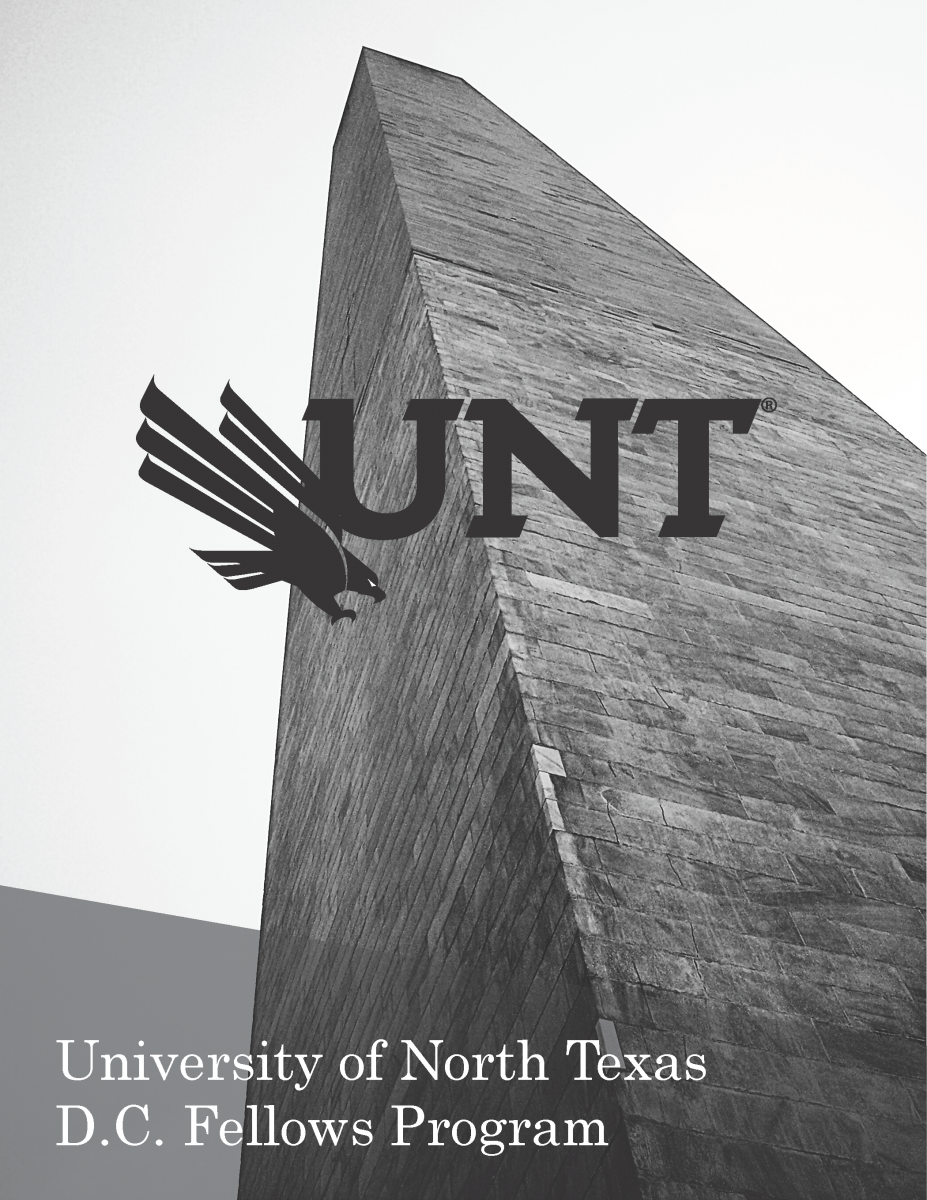2020 Washington D.C. Fellows Program Brochure
Click the image to the right to view the full 2020 cohort and research expertise of each of our UNT fellows. The first cohort of faculty members were nominated by the Deans and Associate Deans of Research within their respective college.
2020 Cohort
College of Business
James Parrish, Department of IT and Decisions Sciences - Dr. Parrish's primary research areas focus on disclosure of sensitive information via social networking sites (SNS) and what causes the spread of disinformation over SNS. He also studies the factors that contribute to the effectiveness of cybersecurity personnel in offensive roles.
Suman Niranjan, Department of Marketing, Logistics, and Operations Management - Dr. Niranjan researches multi- echelon inventory & supply chain optimization, empirical research pertaining to supply chain and logistics, multi-method simulation optimization with application to logistics and supply chain, distracted driving, applied multi-variate statistical analysis, and predictive analytics applied to healthcare and supply chain problems.
College of Education
Ryan Olson, Department of Kinesiology, Health Promotion & Recreation - Dr. Olson's research centers on Behavioral Neuroscience and Exercise Psychology, with an emphasis on implementing behavioral interventions to improve cognitive, cardiovascular, and mental health outcomes.
Colleen Eddy, Department of Teacher Education and Administration - Dr. Eddy's research seeks to provide pathways to STEM Education for both teachers and students. Her research is focused on mathematics instruction and curriculum development, and teacher effectiveness and engagement in middle and secondary schools.
College of Engineering
Qing Yang, Department of Computer Science & Engineering - Dr. Qing's research interests include the Internet of Things, autonomous vehicular system, network security and privacy.
College of Merchandising, Hospitality, and Tourism
Han Wen, Department of Hospitality & Tourism Mgmt. - Dr. Wen's research includes food service management, food safety and food allergies in restaurants, food safety risk communication, and hospitality education.
College of Information
Aleshia Hayes, Department of Learning Technology - Dr. Hayes' research revolves around developing, evaluating, and iterating on technology used for learning in formal and informal environments. Her research focus extends to STEM education in K-12 classrooms and the STEM workforce.
Alexis Palmer, Department of Linguistics - Dr. Palmer is a computational linguist whose research uses linguistic knowledge to guide the development of natural language processing methodologies. Her research is focused on computational methods for low-resource and endangered languages, computational approaches to the analysis of meaning, and automatic detection of abusive language online.
College of Health and Public Service
April Becker, Department of Behavior Analysis - Dr. Becker's research centers on the role of brain systems in the support of lawful behavioral principles and the potential of manipulating these systems to improve learning and recovery from brain injury. She uses rodent models for basic and translational investigations and applies these principles to rehabilitation research in humans with brain injuries.
Elyse Zavar, Department of Emergency Management. & Disaster Science - Dr. Zavar's research examines long-term community recovery from disasters. She focuses on the ways communities reconstruct the built and natural environment to reduce risks to future hazards, including how communities design and use post-buyout open space. Additionally, she explores how communities commemorate such tragedies as part of the long-term recovery process.
College of Visual Arts and Design
Barbara Trippeer, Department of Fashion Design - Trippeer's design specializations focus on exploring the limits of traditional sportswear design development and production, via emerging technologies and alternative materials. She explores how the balance between sustainable manufacturing and emerging technologies impacts the apparel industry.
Christopher Meerdo, Department of Studio Art - Meerdo is an artist, educator, and activist whose interests lie in photography, emerging technologies, and social equity. His work has been exhibited internationally in cities such as: Berlin, Chicago, Reyjkavik, and Maastricht.
School of Journalism
Sara Champlin, Department of Advertising - Dr. Champlin's research focuses on the use of strategic communication principles to improve public wellbeing. She is especially interested in health literacy and the ways communication practitioners facilitate the public's seeking and understanding of health information.
College of Liberal Arts & Social Sciences
Lu Liang, Department of Geography & Environment - Dr. Liang's research is focused on developing novel geospatial monitoring, mapping and modeling approaches to study how the human-environment interactions are manifested in land surface changes.
College of Music
Quincy Davis, Department of Jazz Studies - Dr. Davis is a world-renowned jazz drummer with a keen interest in teaching (esp. high school students) about the important contributions that jazz and its innovators have made to our great American heritage. Band performance, aural presentations, listening and audience participation are methods he employs for understanding this art form and its relevance to society today.
Rebecca Geoffrey-Schwinden, Department of Music History, Theory & Ethnomusicology - Dr. Geoffroy-Schwinden's research studies how music is valuated at the margins of the Western political economy, particularly women. To pursue poorly documented musical experiences, she applies sonically based, digital approaches to historical inquiry.
College of Science
Han Hao, Department of Mathematics - Dr. Hao's research focuses on genetic association tests and disease risk prediction models. Her recent work studies how genetic variants and environmental factors lead to disease subgroups through a hierarchical causal inference model.
Yanyan He, Department of Mathematics - Dr. He is interested in uncertainty quantification (UQ), including model correction based on physical constraints, parametric uncertainty analysis, non-probabilistic uncertainty modeling, and the application of UQ techniques to various disciplines, such as biology, engineering, and oncology.
